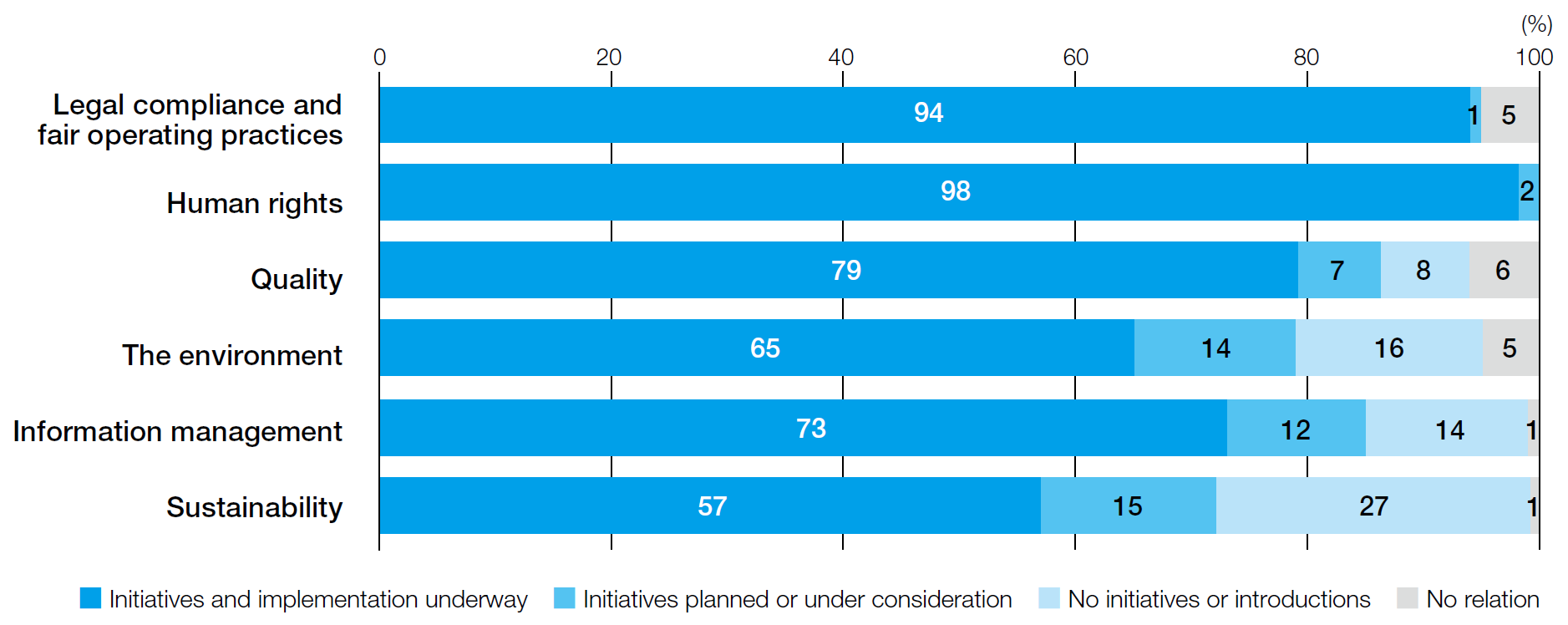Nihon Kohden provides regular compliance training to all of its employees to ensure they have correct understanding and awareness of sound and fair business practices. Departments involved in procurement provide annual training on specific laws and regulations affecting their operations, such as the Fair Competition Code and the Act against Delay in Payment of Subcontract Proceeds. In FY2022, 58 people attended these training sessions.
Nihon Kohden requests business partners to conduct self-assessment on their environmental and quality activities, and, moreover, checks business partners’ understanding of and adherence to the Nihon Kohden Sustainable Procurement Standards through their answers to the Sustainability Questionnaire conducted every year. Opinions expressed through the Questionnaire are fed back to procurement departments and utilized to realize fair and responsible procurement.
In FY2022, we asked 100 of our business partners to answer our Sustainability Questionnaire and were grateful to receive cooperation from all of them. The questionnaire consisted of 22 questions in six areas: legal compliance and fair operating practices, human rights, quality, the environment, information management, and sustainability. In terms of questions about legal compliance and fair operating practices, and human rights, initiatives and implementation were underway, planned or under consideration in more than 90% of our business partners. In previous questionnaires, multiple business partners reported that they have engaged in social contribution initiatives. We continue to work with our business partners to deepen mutual understanding of our sustainable procurement standards and ensure fair trade practices.

Nihon Kohden has identified the following suppliers as key suppliers: suppliers of orders with large purchase amounts, suppliers who provide parts for major and strategic models, and suppliers who provide non-substitutable parts.
In FY2022, we conducted a Supplier Questionnaire for approx. 76 suppliers both in Japan and internationally and got responses. The results of the survey revealed significant differences in the status of initiatives among suppliers. While many suppliers are working to build systems and implement various measures in the areas of Human rights, Quality, and Governance, many are facing challenges in the area of the Environment, such as climate change response initiatives and environmental data acquisition.
|
Theme |
Question |
|
Sustainability Promotion |
|
|
Environment |
|
|
Human Rights |
|
|
Quality |
|
|
Health and Safety |
|
|
Governance |
|
|
Compliance |
|
|
Information Security |
|
To respond to customer needs, we strive to maintain and improve the quality of the components and materials we procure. We have new business partners cooperate with audits to confirm the appropriate operation of quality management systems, and have existing business partners cooperate with periodic reviews of operations and quality audits based on the quality of delivered components. We strive to further enhance quality by getting business partners themselves to understand that the quality of delivered components can have a significant impact on the quality of our end products.
Mining and trading of some minerals in the Democratic Republic of Congo (DRC) and neighboring countries are said to be a source of funding for armed groups that are causing human rights abuses and conflicts in the region. Under these circumstances, the Dodd-Frank Act was enacted in the U.S. in July 2010. This law requires companies listed in the U.S. to report to the Securities and Exchange Commission (SEC) on their use of conflict minerals. In the EU, the Conflict Minerals Regulation was passed in January 2021, requiring companies importing ores and unprocessed metals to identify the OECD Annex II risks in the Conflict Affected and High-Risk Areas (CHARAs), and to report annually on these areas.
In response to this situation, Nihon Kohden has actively cooperated with surveys conducted by our customers on the use of conflict minerals in our products. The survey is conducted using CMRT and EMRT forms to determine whether 3TG (tin, tantalum, tungsten and gold), cobalt, and mica are contained in the components purchased from suppliers. In addition, if a smelter is not certified under the Responsible Minerals Assurance Process (RMAP) conducted by the Responsible Minerals Initiative (RMI), or if conflict minerals linked to issues such as human rights violations or funding sources for armed groups are found to be used in our products, we will take steps to ensure that they are not used.
We have not identified the use of conflict minerals linked to issues such as human rights violations in any of our products we have investigated so far. In the event that our future investigations reveal the use of conflict minerals in our products, we will take steps to eliminate the use of conflict minerals in accordance with the Nihon Kohden Sustainable Procurement Standards and Responsible Mineral Procurement Policy.
